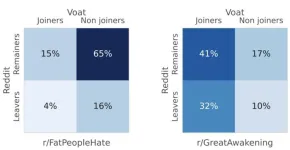(Press-News.org) (WASHINGTON, Oct. 31, 2023) – Individuals living with severe sickle cell disease (SCD) are highly interested in new, potentially curative gene therapy treatments and are willing to accept associated risks for a chance at a cure, according to a study published today in Blood Advances.
SCD is an inherited red blood cell disorder affecting approximately 100,000 people in the United States. According to the Centers for Disease Control and Prevention (CDC), SCD affects one out of every 365 Black or African American births and one out of every 16,300 Hispanic American births. Those living with the disease are born with a genetic mutation that causes their red blood cells to be ‘sickled’ in shape, leading to pain crises and sometimes severe health complications like organ damage and failure.
The current standard of care for SCD includes medications like hydroxyurea that help with symptom management, and procedures such as bone marrow transplant that, when successful, can cure SCD, but is dependent on finding a matched donor and carries a high risk of rejection.
New and emerging gene therapies for SCD extract hematopoietic stem cells (HSCs) from patients with SCD and edit the DNA within the HSC to remove the mutation that causes the development of abnormal red blood cells. The patients then receive high dose chemotherapy followed by reinfusion of their gene-corrected HSCs which will subsequently produce normal (“SCD free”) mature red blood cells. However, the risk-benefit tradeoff of these new therapies is not yet well established. Over the last few years, gene therapy products for blood disorders, cancer, and other rare diseases have also emerged.
“In recent decades, U.S. survival rates for SCD patients have significantly risen, but the average life expectancy is about 60 years – substantially lower than that of the general population,” said Juan Marcos Gonzalez, PhD, an expert in clinical decision sciences and health-preference measurement at Duke University School of Medicine and the study’s lead author. “Although current therapies are beneficial, many patients will not qualify for a bone marrow transplant and the other therapies will not eliminate SCD symptoms entirely.”
Amidst several gene therapies pending U.S. Food and Drug Administration (FDA) approval, Dr. Gonzalez and his team initiated a study to understand patient views on these novel treatments. They used a discrete-choice experiment survey, which presented participants with pairs of hypothetical gene therapy treatments along with a ‘no gene therapy’ option. The gene therapy choices were characterized by their potential to eliminate SCD symptoms, extend life expectancy, and their associated risks, including treatment-related mortality, infertility, and increased cancer risk.
Across three U.S. clinical sites and with the support of Cayenne Wellness, a patient-driven organization, 174 adult patients and 109 parents of children living with SCD completed the survey. Most survey respondents were willing to choose gene therapy over alternatives. However, when gene therapy posed a 10% or greater risk of death, adults with mild symptoms required a higher likelihood of eliminating SCD symptoms (around 67% on average) than parents of children (around 8%) to ultimately choose gene therapy. In contrast, adults experiencing moderate symptoms required lower success rates. To accept gene therapies posing 10% or 30% mortality risks, these patients required 34% and 37% chance of having their SCD symptoms fully resolved, respectively.
Both adults living with SCD and parents of children with SCD most often opted for gene therapies offering higher chances of eliminating SCD symptoms and giving a longer life expectancy, and less often opted for gene therapies with higher chances of death, controlling for other factors.
“From this study we see that adults and parents of children with SCD are willing to endure a relatively high level of risk to have their disease symptoms alleviated,” said Dr. Gonzalez. “And I think that this demonstrates just how burdensome this disorder is. Parents would show us videos of their children crying because they were having pain crises. As a parent, there's nothing more gut-wrenching than seeing your child in excruciating pain and not being able to do anything about it.”
Dr. Gonzalez emphasizes that while gene therapies are exciting treatment options and represent a significant breakthrough in the treatment of the disease, they are expensive and researchers were unable to factor in cost-of-treatment into survey questions.
One limitation of the study is that the survey was designed during gene therapies' development and the researchers had to make educated assumptions about potential risks and respondents had to self-report their symptom severity. Finally, the study focused on patient opinions of one kind of gene therapy using CRISPR-Cas9 technology, but with various gene-engineering techniques emerging, risks and benefits will differ among these technologies.
“Numerous different approaches to gene therapy have emerged since we began this study,” said Dr. Gonzalez. “And as different types of gene therapies gain approval, patients and their providers will have to decide what is best for them. We hope to continue exploring patients’ understanding and willingness to try new therapies in years to come.”
# # #
Blood Advances (www.bloodadvances.org) publishes more peer-reviewed hematology research than any other academic journal worldwide and is an online only, open access journal of the American Society of Hematology (ASH), the world’s largest professional society concerned with the causes and treatment of blood disorders. Blood Advances is part of the family of Blood Journals.
Blood Advances® is a registered trademark of the American Society of Hematology.
Contact:
Kira Sampson, American Society of Hematology
ksampson@hematology.org; 202-499-1796
END
AMES, Iowa – Since 2011, roughly 10,000 people in the U.S. have turned 65 every day. The Baby Boomer generation and those born before 1946 make up the country’s fastest growing age group, which is on track to outnumber children by 2035.
“As this large demographic ages, it’s really important to support health promoting behaviors and have an approach that focuses on prevention — not just treatment — when it comes to chronic diseases. To do that, we need to know what their needs are and how best to address those needs,” says Sarah Francis.
Francis holds many titles at Iowa State University: professor and ...
Highlights:
Gonorrhea is difficult to treat, and there is no approved vaccine.
AI can help researchers search through banks of potential proteins to use in a vaccine.
In a new study, researchers used AI to identify 26 potential new antigens.
A combination of 2 novel antigens elicited antibodies that killed Neisseria gonorrhoeae bacteria in lab experiments and reduced gonococcal colonization in mouse models.
The group has now partnered with a South African company to develop an experimental mRNA vaccine using the antigens.
Washington, D.C.—Gonorrhea, a sexually transmitted bacterial ...
New York, NY (October 30, 2023)—The Icahn School of Medicine at Mount Sinai will award its 2023 Maria I. New International Prize for Biomedical Research to Jean-Laurent Casanova, MD, PhD, for revolutionizing our understanding of human infectious diseases through the discovery of genetic and immunological determinants that underpin both rare and common infectious illnesses.
The prize honors medical pioneers in the tradition of Maria I. New, MD, a world-renowned researcher in pediatric genetic disorders with a special focus ...
A groundbreaking research project spearheaded by NYU Tandon School of Engineering will bring cutting-edge immersive three-dimensional (3D) video to dance education, making learning the art form more available to a diverse range of students.
The project, supported by a new $1.2 million four-year grant from the National Science Foundation, aims to make Point-Cloud Video (PCV) technology suitable for streaming onto standard Internet-connected devices.
Developed over the past decade, PCV is a type of highly-detailed 3D video that allows viewers to “move” within an immersive video environment, observing objects and scenes from any angle or distance as if they ...
Plants produce a dizzying array of chemical compounds known as secondary metabolites, which help them flourish under fluctuating environmental conditions. Some of these metabolites defend against insect attack, while others help plants communicate, time life cycle events, or attract pollinators, among other functions. Humanity has long taken advantage of these bioactive natural products, using them as medicine, flavorings, dyes, perfumes, and even industrial materials. Production of secondary metabolites is typically controlled by transcription factors. Tsubasa Shoji and colleagues sought to identify unexplored secondary metabolites by manipulating these upstream regulators ...
CORVALLIS, Ore. – Firsthand observations of a wolf hunting and killing a harbor seal and a group of wolves hunting and consuming a sea otter on Alaska’s Katmai coast have led scientists to reconsider assumptions about wolf hunting behavior.
Wolves have previously been observed consuming sea otter carcasses, but how they obtain these and the frequency of scavenging versus hunting marine prey is largely unknown. Scientists at Oregon State University, the National Park Service and Alaska Department of Fish and Game are beginning to change that with a paper just published ...
Today, the Alzheimer’s Association, Global Brain Health Institute (GBHI), and the UK-based Alzheimer’s Society announced the most recent awardees of the Pilot Awards for Global Brain Health Leaders, a competitive funding initiative dedicated to nurturing efforts and improving outcomes in the fields of brain health and dementia.
“The Alzheimer’s Association is proud to partner with GBHI and the Alzheimer’s Society to make these innovative grants,” said Heather M. Snyder, Ph.D., Alzheimer’s Association vice president of medical and ...
If anesthesiologists had a rigorous means to manage dosing, they could deliver less medicine, maintaining exactly the right depth of unconsciousness while reducing postoperative cognitive side effects in vulnerable groups like the elderly. But with myriad responsibilities for keeping anesthetized patients alive and stable, as well as maintaining their profoundly unconscious state, anesthesiologists don’t have the time without the technology.
To solve the problem, researchers at The Picower Institute for Learning and Memory ...
Social media can incubate communities that are so resilient that even banning them from the platform cannot destroy them. Michele Starnini and colleagues studied two online communities on the social media site Reddit: the far-right conspiracy theory subreddit GreatAwakening, which was banned in 2018, and the hate-speech subreddit FatPeopleHate, banned in 2015. Both communities decided amongst themselves to move to Voat, an unmoderated Reddit clone designed to serve those banned by Reddit. The authors estimate that less than 20% of FatPeopleHate users migrated to Voat, while more than 70% of GreatAwakening users migrated to the new platform. This result suggests that members ...
· CCDC extends its partnership with Orgmento, a Ghanaian software engineering and data sciences company.
· The partnership, which started in 2021, has been strengthened by the shared commitment to engineering excellence from both organizations, and has now been extended for a further 3 years.
· Software engineering teams from the CCDC and Orgmento will build software to advance structural science.
Cambridge, UK. 31 October 2023
The Cambridge Crystallographic ...





